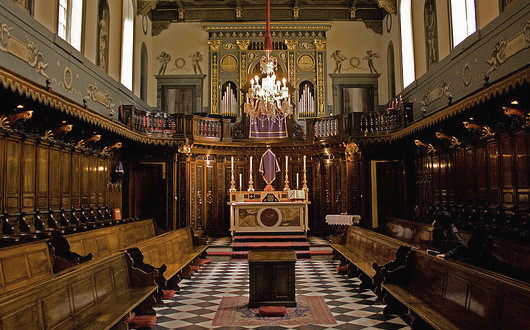Benedict XVI
About Andrew Cusack
 Writer, web designer, etc.; born in New York; educated in Argentina, Scotland, and South Africa; now based in London.
Writer, web designer, etc.; born in New York; educated in Argentina, Scotland, and South Africa; now based in London. read more
News
Blogs
Reviews & Periodicals
Arts & Design
World
France
Mitteleuropa
Knickerbockers
Argentina
The Levant
Africa
Cape of Good Hope
Netherlands
Scandinavia
Québec
India
Muscovy
Germany
Academica
Joy
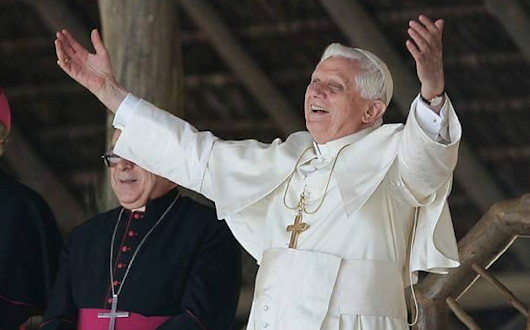
Something I constantly notice is that unembarrassed joy has become rarer. Joy today is increasingly saddled with moral and ideological burdens, so to speak. When someone rejoices, he is afraid of offending against solidarity with the many people who suffer. I don’t have any right to rejoice, people think, in a world where there is so much misery, so much injustice.
I can understand that. There is a moral attitude at work here. But this attitude is nonetheless wrong. The loss of joy does not make the world better — and, conversely, refusing joy for the sake of suffering does not help those who suffer. The contrary is true. The world needs people who discover the good, who rejoice in it and thereby derive the impetus and courage to do good. Joy, then, does not break with solidarity. When it is the right kind of joy, when it is not egotistic, when it comes from the perception of the good, then it wants to communicate itself, and it gets passed on. In this connection, it always strikes me that in the poor neighborhoods of, say, South America, one sees many more laughing happy people than among us. Obviously, despite all their misery, they still have the perception of the good to which they cling and in which they can find encouragement and strength.
In this sense we have a new need for that primordial trust which ultimately only faith can give. That the world is basically good, that God is there and is good. That it is good to live and to be a human being. This results, then, in the courage to rejoice, which in turn becomes commitment to making sure that other people, too, can rejoice and receive good news.
Better late than never
Old hat already, but following the announcement of Benedict XVI’s abdication, the Los Angeles Times solicited opinions from eleven American Catholics — among them your humble & obedient scribe — what they would like to see in the new pope.
I posted in on Twitter, but in case you didn’t catch it there, you can find my contributions (in addition to those of the ten others) at this link. (more…)
Against the Dictatorship of Relativism
Pope Francis continues Benedict XVI’s fight
… But there is another form of poverty! It is the spiritual poverty of our time, which afflicts the so-called richer countries particularly seriously. It is what my much-loved predecessor, Benedict XVI, called the “dictatorship of relativism”, which makes everyone his own criterion and endangers the coexistence of peoples. And that brings me to a second reason for my name. Francis of Assisi tells us we should work to build peace. But there is no true peace without truth! There cannot be true peace if everyone is his own criterion, if everyone can always claim exclusively his own rights, without at the same time caring for the good of others, of everyone, on the basis of the nature that unites every human being on this earth.
“For those tempted to draw an overly sharp distinction between Pope Francis and his predecessor,” John Allen reports, “the new pope offered a clear reminder Friday that he may have a different style than Benedict XVI, but on substance, he’s cut from much the same cloth.”
“In a speech to the diplomatic corps accredited to the Holy See on Friday, Francis lamented not only the material poverty of the early 21st century but also its ‘spiritual poverty,’ meaning a rejection of God and objective standards of morality.”
Also, I found it interesting that the Holy Father noted that his background in an Argentine family of Italian origin impelled him in his role as bridge-builder. Naturally, as someone from an Estadounidense family of Irish origin, I feel a certain parallel kinship to this first American pope.
[Note: The boldface below is mine.] (more…)
Grazie
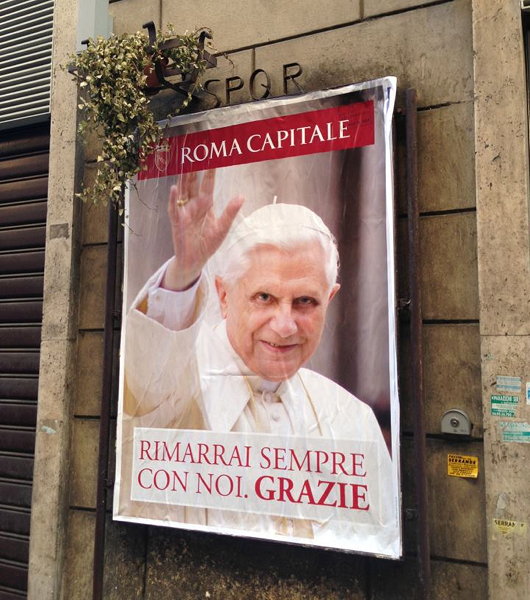
“You will always be with us. Thank you.”
The municipal authorities have put these posters up all around Rome.
Vigil of Prayer at the Oratory
until
Friday 1 March 7am
There will be an Adoration Vigil (Exposition of the Blessed Sacrament) in the Little Oratory praying for the Church as we end the pontificate of Pope Benedict XVI, thanking God for all the graces during this pontificate and asking the guidance of the Holy Spirit for the cardinals as they meet to elect the new Pope.
The Vigil will begin Thursday 28 February at 9.30 in the evening and conclude with Mass at 7am the following morning.
Brompton Oratory
Brompton Road
London
SW7 2RP
Media Lies About the Pope
In an interview, Benedict XVI reaffirmed the immorality of using condoms, but the press have spread a lie claiming he did the exact opposite
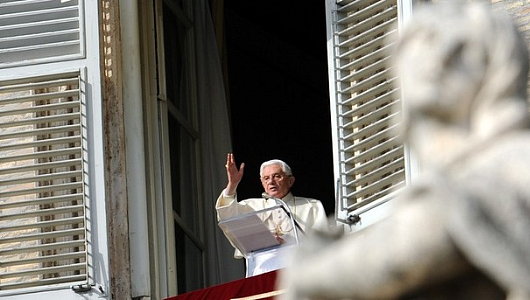
Wow. Just wow. No matter how low my opinion of journalists and the media already is, they’ve proved that they still have the ability to astound by the depths of their depraved mendacity. The latest big giant whopper the media are dealing out is that Pope Benedict XVI has ‘changed church teaching’ by ‘lifting the absolute ban on condom use’. You should know by now that when the media report almost anything relating to the Pope or the Church, the reality is either A) the media have completely made it up, or B) the exact opposite of what the media say is true.
This one we can file under “B”: the Pope has reaffirmed the immorality of using condoms and the media have decided to claim the opposite. A new book, Light of the World is being published this week containing several interviews with the Pope by the German journalist and editor Peter Seewald.
When asked about the Church’s teaching on condoms, the Pope reaffirmed that the Church “of course does not regard it as a real or moral solution”. However, the Holy Father speculated about the intent of some condom users. (more…)
The Daily Telegraph Prints Lies
Stop blaming ‘the media’: it’s time to call out the bad apples by name

Strictly speaking, a lie is a false statement with the intent to deceive. Without the ability to read minds, it’s difficult to discern when someone who has made a false statement is intentionally lying or has merely been incorrectly informed. The intent of a journalist should be to inform — but today the deed of journalists is more often to deceive (whether intentional or otherwise). To cite but one example, Jonathan Wynne-Jones (pictured above) holds the job of Religious Affairs Correspondent for the Daily Telegraph, the widely read British broadsheet which claims to be a ‘quality’ newspaper.
 Read Mr Wynne-Jones’s article alleging that the Pope “has ended the Church’s absolute ban on the use of condoms”. Wynne-Jones spreads this lie from the very first sentence and continues along the same lines throughout the piece. His selective quotation is interesting, as is the fact that the fuller quotations he cites in no way back up the false contentions Wynne-Jones makes in the article.
Read Mr Wynne-Jones’s article alleging that the Pope “has ended the Church’s absolute ban on the use of condoms”. Wynne-Jones spreads this lie from the very first sentence and continues along the same lines throughout the piece. His selective quotation is interesting, as is the fact that the fuller quotations he cites in no way back up the false contentions Wynne-Jones makes in the article.
Let’s have a look at the article. (more…)
Alan Dershowitz Defends Pope Benedict
Benedict XVI has “Done More to Protect Young Children” Than Any Other Pope According to Harvard Law Professor
The Harvard Law School professor & criminal appellant attorney Alan Dershowitz has defended Pope Benedict XVI while speaking to a television news programme in Australia. Dershowitz travelled to the continent to take part in a debate with the lawyer & activist Geoffrey Robinson QC who has waged a campaign to have the Pope tried under international law as culpable for the abuse of children by Catholic priests.
Robinson (a dual citizen of Australia and Great Britain) is well-known in legal and intellectual circles, where he has defended the use of kangaroo courts to try and convict alleged perpetrators of great crimes: his 2005 book The Tyrannicide Brief defended John Cooke, the solicitor general who prosecuted Charles I of England for treason. The Australian academic has also defended the practice of more powerful nations waging war against smaller ones to prevent the latter from committing crimes against humanity, and has argued in favour of the bombings of Hiroshima and Nagasaki.
Dershowitz told the Australina Broadcasting Corporarion’s Tony Jones that Robertson’s attempt to have Pope Benedict tried before under international law was “wrong”.
International law deals with war crimes, it deals with systematic efforts by governments to do what happened, for example, in the former Yugoslavia and Rwanda, in Darfur and Cambodia. This is not in any way related to that. … This is not a crime against humanity, this is a series of crimes by individual priests and others throughout the world and failures by institutions to come to grips with it quickly enough.
Prof. Dershowitz said he thought Benedict has “probably done more to protect young children since becoming Pope than any previous Pope”. (more…)
Interesting Things Elsewhere
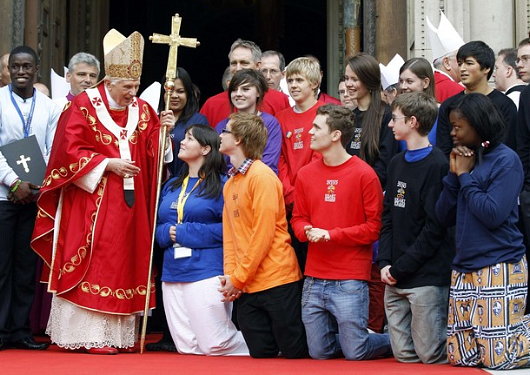
Benedict and Britain
The papal visit began in Scotland, and the smaller setting (Scotland has just five million people, fewer than London alone) proved a wiser starting point of the pontiff’s trip to Great Britain. “Would the first day have been the success it was if it had taken place in England?” asked William Oddie. “Would the papal chemistry have worked so soon in London, that vast and engulfing megalopolis, if the reception by Her Majesty had taken place in the impersonal splendours of Buckingham palace rather than in that ancient architectural wonder Holyrood house (whose very stones are a testimony to its Catholic origins) and if the Popemobile ride through the streets afterwards had been down the Mall?”
Damian Thompson has argued that the papal visit has proved a triumph for Benedict and a humiliation for the secular-humanist crowd. The Daily Telegraph blogs editor and Catholic Herald editor-in-chief says that the Pope’s natural shyness has worked to his advantage, while the former Spectator editor Dominic Lawson argued in the Independent that Benedict’s unpolitical nature gives him a popular appeal.
The volume and biliousness of the media’s campaign against Benedict XVI has actually backfired and turned the lukewarm into pope-welcomers (like Kate Hoey MP, reports Christina Odone). Another blogger reported the influence a television programme produced by the gay activist and sometime paedophilia sympathiser Peter Tatchell that was broadcast just before the Pope’s arrival:
‘Are you going tomorrow?’ I asked. ‘Yes, I am,’ she replied. ‘I wasn’t going to at first, because it’s a long day, but when I saw that rubbish last night on the telly, I changed my mind. I’m don’t care if I die there; I’m going.’
Meanwhile Mark Dowd, another homosexual, was determined to be even-handed in his documentary “Benedict: Trials of a Pope”, and his broadcast was well-received. The filmmaker wrote in the Catholic Herald “when you have to make a one-hour programme on one of the most clever and gifted people on the planet you have to look behind the headlines and the angry rants on the blogosphere. In short, you have to do justice to the man as best as you can.”
Hilary White had a chat with barrister and Catholic Union chairman Jamie Bogle, who argued that the visit has taken the wind out of the sails of Benedict’s enemies.
“Jamie also pointed out that the protesters were having a bit of fun with the numbers,” Hilary writes. “A friend in Vancouver said that 25,000 turned out for the demonstration. The National Secular Society said it was ‘between 10 and 12,000’. But Jamie told me he had spoken with some of the cops present, and they said it was no more than 2,000.”
It was like a scene from 1984
Atheist Brendan O’Neill reported being disturbed by the anti-papal demonstrators, reporting that there is “a sharp authoritarian edge” to the radical pope-haters. “Things turned ugly outside Downing Street when Terry Sanderson of the National Secular Society branded the pope an ‘enemy of the state’, giving rise to the cacophonous chant: ‘GO HOME POPE, GO HOME POPE.’ It was like a scene from 1984. I have been on many a radical demo that has challenged the branding of some group or individual as ‘enemies of the state’; but this is the first radical demo I’ve been on where the protesters themselves demanded the silencing and even expulsion from Britain of someone they decreed to be an ‘enemy of the state’. Even one-time ‘enemies of the state’ – the so-called queers and the old left – were using that criminalising phrase, that piece of political demonology, to chastise the pope. It was the world turned utterly upside down.”read more
Also: The campaigners against the pope’s visit have more in common with the fanatical Inquisitors of old than with Enlightened liberal humanists, says Frank Furedi.
The conservative case for rail
File this one under “things we always knew and are glad someone agrees”: the dissident conservative fortnightly The American Conservative presents a symposium of articles about getting the USA back on the rails. William Lind attempts to destroy the myth of public-transport-hating conservatives while attacking the rampant subsidisation of federal highways. Former Milwaukee mayor John Norquist says the Right shouldn’t surrender the cities to the Left. Glen Bottoms does the numbers on the return to rail and tries to figure out how much it will cost. Finally, John Robert Smith argues that there’s still some life in America’s Main Streets. Christopher Leinberger discusses how private development can fund public infrastructure. read more
The Thomist constitution
St. Thomas Aquinas, the “Dumb Ox”, stated that “all should take some share in the government: for this form of constitution ensures peace among the people, commends itself to all, and is most enduring”. Aelianus muses on a Thomistic view of government, explores the pros and cons of monarchy, aristocracy, democracy, and ponders the political position of the family in society. read more
Swedish under threat in Finland
Swedish was historically the language of Finland’s nobility and intelligentsia, as well as of the country’s ethnic Swedish minority — Finland’s first president and greatest hero, Field Marshal Mannerheim, could barely even speak Finnish. But while the Scandinavian land is still officially bilingual in education and government, the 5.5% of the population who are Swedish-Finns is increasingly viewed as “the world’s most pampered minority”. read more
The Südtirol success story
Amid the warnings of doom and gloom ahead for the Italian economy, one province has almost full employment and a healthy economy, not to mention a governor who has ruled for over twenty years. “We are living in the promised land,” — Südtirol. read more
Follow the Pope’s Visit
What are the best ways of following the Pope’s visit to Great Britain? The official website is offering a live webcast of all events, with highlights from the day interspersed between events. The Daily Telegraph is live-blogging the papal events each day, with frequent updates; today can be found here. The Catholic Herald is also live-blogging the Papal Visit, and updates on today’s events can be found here.
Check catholicherald.co.uk and telegraph.co.uk for more throughout the visit.
Rod Dreher is Profoundly Mistaken
Rod Dreher, a normally interesting commentator and incisive thinker, is profoundly mistaken in his response to the Pope’s handling of the Schönborn-Sodano spat, and betrays a fundamental misunderstanding of what’s gone on.
In April, Cardinal Schönborn, the Archbishop of Vienna, publicly and by name criticised Cardinal Sodano, the former Vatican Secretary of State, accusing him of having frustrated attempts to investigate abuse by clerics and further criticising his dismissal of some claims of abuse as “petty gossip”. These criticisms were largely seen as justified in their substance but were note-worthy as it is not customary for cardinals to attack one another publicly and by name.
The Pope then oversaw a meeting between Cardinal Schönborn and Cardinal Sodano (who, since 2006, is no longer Secretary of State) as an act of reconciliation. Alongside this meeting, a statement was released which included a gentle reminder that authority over the College of Cardinals is reserved to the Holy Father, and that likewise the supervision and criticism of cardinals is reserved to him, in consultation with others.
The reservation of this right to the Pope is both wise and justified. The basic idea is that cardinals are not to waste their time criticising one another, lest they, being human, be tempted into continual criticism which would interfere with and impede the work of their fellow cardinals.
The gentle reminder in this statement has, unfortunately, been blown completely out of proportion by the media. Rod Dreher has only augmented this with his commentary, but in doing so betrays a fundamental error that he made: his comments cite an Associated Press report of the supposed “unprecedented public rebuke”.
It is no surprise that Dreher found the AP report “both heartbreaking and infuriating”, as that is generally what AP reports related to the Church are designed to do. The Associated Press has fairly consistently and over a long period of time demonstrated their lack of reliability or journalistic credibility owing to their complete lack of understanding of how the Church operates and their undercurrent of antagonism to Christianity in general.
It is more “heartbreaking and infuriating” that a man as smart as Rod Dreher has had such a lapse of judgement as to allow the Associated Press to be the informer of his thoughts and guide of his heart. Dreher’s claim that Pope Benedict has “humiliated” Schönborn is complete nonsense, which is the result of Dreher’s unfortunate trust in the sham journalism of wire services. Dreher is also simplistic in his treatment of Cardinal Schönborn, who has been known to have gone a bit loopy of late, even to the extent of expressing reserved support for the ridiculous “apparitions” at Medjugorje, and even suggesting the Pope might visit the town some day.
The Archbishop of Vienna’s stringent stand against clerical abuse is nonetheless a most welcome counterpoint to the lackadaisical approach of the John Paul II-era curia. Small wonder the Pope spent the beginning of his pontificate making very wise replacements of questionable JP2 appointments, and continues to have a good eye for decent churchmen and for appropriate roles for them to exercise in the Vatican.
“This action by the pope is not a sign of strength,” writes Dreher, “but its opposite.” Does Dreher really think that allowing a cardinalatial free-for-all would be a sign of strength, while taking steps to remind cardinals of their obligations is a sign of weakness? Rather, Benedict has, as has been the mark of his pontificate, taken the route of gentleness and reconciliation while simultaneously stressing the need for order and unity.
Reese Still Doesn’t Get It
“Reform movements need an enemy to organize against,” Fr. Thomas Reese, the former editor of America magazine tells TIME (which I stumbled upon at Conservative Blog for Peace). “As most bishops have gotten their acts together on sex abuse, they have looked less like the enemy and more like part of the solution. Enthusiasm for reform declined. With the Pope’s forthright response, it will decline even more.”
Bishops “getting their acts together” is reform! But of course, Fr. Reese is using the word “reform” in an Orwellian manner, meaning not reform, but in fact revolt. His use would be disingenuous, except that I suspect Fr. Reese has actually convinced himself it is appropriate: as the saying goes, “never attribute to malice that which can be adequately explained by …” well, let’s remain charitable and say “credulity”.
As bishops institute genuine reform, the sympathy — never more than limited — for progressive change-for-change’s sake unsurprisingly disappears except among the old die-hards like Fr. Reese. Enthusiasm for reform — genuine reform that is — only grows, especially in those places where it has been implemented, in accordance with the Pope’s clearly stated desires. If he is anything, Benedict XVI is a pope of reform, of putting the house back in order.
One almost feels a tinge of pity for the Fr. Reeses of this world as their hopes and dreams slip further and further away, but then one remembers it is entirely their own fault. He who marries himself to the Spirit of the Age is soon widowed. Attach yourself to the permanent things and you will never end up like poor Fr. Reese.
“The Reality is Love”
“The doom and gloom conveyed by the media is not the full picture.”
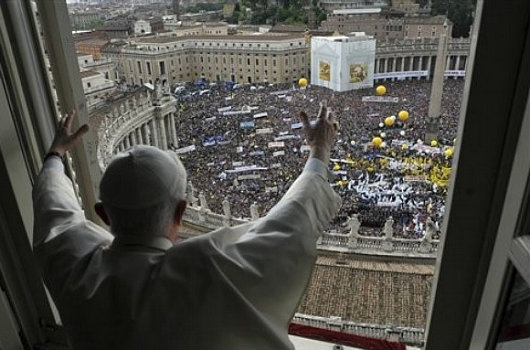
by HILARY WHITE
ROME, May 17, 2010 (LifeSiteNews.com) – There is one thing that still surprises me about Italy: the Italians love the pope. Even when they don’t necessarily listen to or obey him on every point, even when he is not an Italian, the Italians have a genuine and very warm paternal relationship with the holder of the Keys. This Sunday, 150,000 people packed into St. Peter’s Piazza to hear Benedict XVI give an address after reciting the Regina Caeli, and to show their Holy Father their love and support after the trying period of the last few months.
I suppose coming from the Anglo world, imbued with its perpetually simmering anti-Catholicism inherited from the Elizabethans and the Glorious Revolution, it will always come as a pleasant surprise to see that, whatever vitriol the mainstream media of the anglosphere continues to pour onto this papacy, that vitriol is not the reality. Whatever Reuters or the New York Times or even Ansa will tell you, the crowd of over 150,000 people gathered in St. Peter’s Piazza on Sunday were nearly beside themselves with joy to see their Papa.
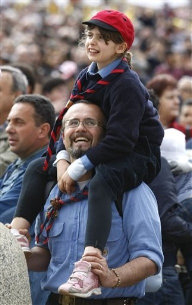 It has been unseasonably cold and raining more or less steadily for weeks, and being still something of a newbie around here, I had not expected to have to hurry on Sunday. Still thinking like an Anglo and not expecting the Italian enthusiasm for their pope, I had planned to make my way over to St. Peter’s Piazza about 11:30, and thought I could take a leisurely 9:30 train into the City and take the bus down to the Campo di Fiori to have a sandwich and a cup of awful Roman tea first. But in the café a television was playing live coverage of the Piazza and I could see the crowd was already, at 10:45, starting to fill the huge space. I took my panino di pollo to go.
It has been unseasonably cold and raining more or less steadily for weeks, and being still something of a newbie around here, I had not expected to have to hurry on Sunday. Still thinking like an Anglo and not expecting the Italian enthusiasm for their pope, I had planned to make my way over to St. Peter’s Piazza about 11:30, and thought I could take a leisurely 9:30 train into the City and take the bus down to the Campo di Fiori to have a sandwich and a cup of awful Roman tea first. But in the café a television was playing live coverage of the Piazza and I could see the crowd was already, at 10:45, starting to fill the huge space. I took my panino di pollo to go.
I had read that the Piazza could hold about 100,000 people, and remembered the day a couple of years ago when the Italians gathered to give a collective two-fingers-up to Rome’s heavily secularist Sapienza University, who had insulted their Holy Father by rescinding his invitation to speak. The English-language press was most reluctant to report that thousands of happy, shouting, smiling Sapienza students filled the square at the General Audience that week.
Today they are admitting that the Piazza held over 150,000 on Sunday, called together from all over Italy by a coalition of Italian lay associations – and that seems about right. What they don’t seem to want to report is the spell of joy that held them, many of whom waited for hours to see and hear and shout cheers to the pope. (more…)
“There is no Generation Benedict”
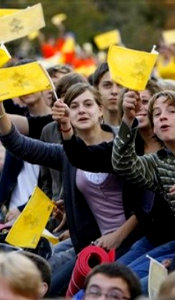 So claims Germany’s Catholic youth leader Dirk Tänzler, who is ‘reserved’ & ‘ambivalent’ about the Pope. Is Tänzler right?
So claims Germany’s Catholic youth leader Dirk Tänzler, who is ‘reserved’ & ‘ambivalent’ about the Pope. Is Tänzler right?
AMIDST THE MEDIA’S attempts to sling mud at Pope Benedict XVI, one of the most prominent Catholic youth leaders in Germany has chimed in with lackluster words about the reigning pontiff. Dirk Tänzler, the head of the BDKJ, the umbrella group of German Catholic youth organizations, gave an interview to Der Spiegel, the prominent weekly news magazine with a circulation of over one million. Asked his verdict of the so-far five years of Pope Benedict’s reign, Tänzler responded with the word “ambivalent”. Contrasting Benedict XVI with John Paul II — a “showmaster” — the BDKJ head said that, despite some good points, “a lot of young people often simply don’t understand him”. “Most have a different idea of how to live their lives than the pope might imagine for them. There is no ‘Generation Benedict.'”
But are Tänzler’s thoughts an accurate reflection of the state of Catholic youth in Germany or elsewhere? Over a million young people travelled to Cologne to experience World Youth Day with the new pontiff in 2005. (The following WYD held in Sydney in 2008, unfortunately offers little comparison given the relative isolation of Australia). Everywhere the Pope has travelled, such as to the Czech Republic last year, or France and the United States in 2008, vast multitudes of youth have greeted him, often waiting hours for the privilege. (more…)
French Intellectuals Pen ‘Appeal to Truth’ In Support of Benedict XVI
A number of prominent French men & women have written a ‘call to truth’ supporting Pope Benedict XVI in the current media storm and pedophilia scandal. As the Appeal’s about page says, Pope Benedict XVI “is the first pope to address head-on, without compromise, the problem. Paradoxically, he is the subject of undermining and personal attacks, attacks relayed with a certain complacency on the part of the press”.
The list of original signatories includes writers, essayists, literary critics, bloggers, professors, philosophers, businessmen, senators, members of parliament, mayors, publishers, actors, a Protestant minister, a Fields medal winner, and even a sexologist.
The ‘Appel à la Vérité’ is reproduced, in an unofficial English translation, below:
The cases of pedophilia in the Church are, for all Catholics, a source of profound grief and great sorrow. From members of the Church hierarchy were, in some cases, serious deficiencies and failures, and we welcome the Pope’s wish to shed light on these cases.
With the bishops, and as members of the Church, lay Catholics bear the brunt of the crimes of certain priests and failures of their superiors; they fall firmly, as Christ taught, on the side of those who suffer most from these crimes, the victims, while praying for the culprits.
As for us, we hope with all our hearts that the whole truth comes out and all in the Catholic Church that could enable these offenses brought to Christ should be discussed calmly and amicably amongst all men and women of good will.
At the same time, we regret the runaway and provocative press that accompany these cases. Beyond the legitimate & democratic right to information, we can only note with sadness, as Christians but also as citizens, that many media in our country (and in the West in general) treat these cases with bias, ignorance, or delight. Shourtcuts in generalizations, the portrait of the Church which is currently done in the press does not match the experiences of Catholic Christians.
While reiterating our horror at the crime of pedophile priests and our solidarity with the victims, we urge the media to an ethic of responsibility that would undertake a more ethical treatment of these cases. The effects of runaway media are, by far, reserved to the Church, but we are tired of and battered by this thrashing. We think of so many priests who courageously, and sometimes in solitude, bear the message of Christ.
We are with them.
We welcome the letter from the bishops of France to Pope Benedict XVI, and wish to see the Catholic Church, with serenity and responsibility, through this painful ordeal.
This appeal was launched at the initiative of François Taillandier (writer), Frigide Barjot (humourist), Natalia Trouiller (journalist & blogger), Koz (blogger & lawyer), and Francis Miclo (philosopher).
Original signatories (31 March 2010):
Jacques Arènes (pyschoanalyst and writer)
Denis Badré (senator)
Frigide Barjot (humourist)
Jean-Marc Bastière (journalist and writer)
Claude Bébéar (honorary president of AXA)
Michel Boyancé (Dean of the Institut de France and comparative philosopher)
Rémi Brague (philosopher, member of the Institut de France)
Alexis Brézet (journalist)
Jean des Cars (writer)
François Cassingena-Trévedy (Benedictine monk, liturgist and writer)
Jean Chélini (historian, permanent secretary of the Académie de Marseille)
Ghislain du Chéné (international coordinator of Foi et Lumière)
Colette Combe (pscyhoanalyst and writer),
François Content (Director-General of the Fondation d’Auteuil)
Philippe Delaroche (writer, journalist)
Chantal Delsol (writer and philosopher)
Patrick Demouy (historian, university professor)
Bernadette Dupont (senator)
Bertrand d’Esparron (corporate communications manager)
Emmanuel Falque (philosophee and writer)
Olivier Florant (sexologist)
Jean-Christophe Fromantin (mayor of Neuilly-sur-Seine, businessman)
Réginald Gaillard (Editions de Corlevour)
Patrick de Gméline (historian)
Samuel Grzybowski (President/founder of the association Coexister)
Fabrice Hadjadj (essayist and playwright)
Rona Hartner (singer, actress)
François Huguenin (writer)
Vincent Hervouët (journalist)
Yvon Jacob (chief executive, former member of parliament)
Gaspard-Marie Janvier (writer)
Pasteur Alain Joly (Lutheran Church)
Patrick Kéchichian (writer and literary critic)
Koz (blogger and lawyer)
Louis-Etienne de Labarthe (editor-in-chief, Il est vivant)
Philippe de Lachapelle (director of the OCH)
Laurent Lafforgue (mathematician, winner of the Fields medal)
Gérard Leclerc (essayist, journalist)
Henrik Lindell (journalist)
Michael Lonsdale (actor)
Victor Loupan (editor, La Pensée Russe)
Jean-Baptiste Maillard (journalist, essayist)
Bruno Maillé (teacher, essayist)
François Maillot (Director-General, La Procure)
Jean-Luc Marion (philosopher, member of the Académie Française)
Jean-Pierre Marcon (member of parliament)
Nicolas Mathey (Professor of Law, Université de Paris V)
Jean-Pierre Machelon (Professor of Law, Université de Paris V)
Marc Mennessier (journalist)
François Miclo (philosopher)
Jean-Marc Nesme (member of parliament & mayor)
Philippe Oswald (journalist)
Xavier Patier (writer)
Patrice de Plunkett (writer and blogger)
Hugues Portelli (senator)
Jean-Frédéric Poisson (member of parliament)
Aymeric Pourbaix (journalist)
Guillaume de Prémare (communications consultant, Médias & Evangile)
Edmond Prochain (blogger, journalist)
Samuel Pruvot (journalist)
Jacques Rémiller (member of parliament & mayor)
Alina Reyes (writer)
Damien Ricour (actor)
Ivan Rioufol (essayist, journalist)
Catherine Rouvier (jurist, political scientist)
Jean Sévillia (journalist, writer)
Grégory Solari (editor)
Raphaël Stainville (journalist)
Denis Sureau (editor, theologian)
François Taillandier (writer)
Denis Tillinac (writer)
Henri Tincq (journalist and writer)
Hubert de Torcy (editor-in-chief, L’1visible)
Vincent Trémolet de Villers (journalist)
Natalia Trouiller (blogger, journalist)
Didier Truchet (Professor of Law, Université de Paris II)
Patrick Tudoret (writer)
Christian Vanneste (member of parliament)
François de Wendel (business executive)
The Passion of Pope Benedict: Six Accusations, One Question
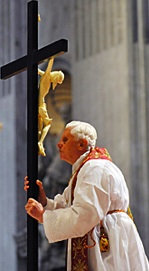 Pedophilia is only the latest weapon aimed against Joseph Ratzinger. And each time, he is attacked where he most exercises his leadership role. One by one, the critical points of this pontificate.
Pedophilia is only the latest weapon aimed against Joseph Ratzinger. And each time, he is attacked where he most exercises his leadership role. One by one, the critical points of this pontificate.
NOTE: For its combination of succinctness and clarity of thought, this piece by the most indispensable of Vatican-watchers, Sandro Magister of L’Espresso, deserves reproduction in full.
ROME, April 7, 2010 – The attack striking pope Joseph Ratzinger with the weapon of the scandal posed by priests of his Church is a constant of this pontificate.
It is a constant because every time, on different terrain, striking Benedict XVI means striking the very man who has worked and is working, on that same terrain, with the greatest foresight, resolve, and success. (more…)
A little lack of logic on Pope Benedict from the Guardian’s John Hooper
Over at the Guardian (Britain’s best daily, whether you like it or not!), Rome correspondent John Hooper writes an informative article about the upcoming beatification of Spanish journalist Manuel Lozano Garrido (1920-1971). I’d never heard of “Lolo”, as the saintly journo was known both during his life and afterwards, and was happy to be introduced to yet another shining star of Spain’s happy glut of twentieth-century saints & blesseds.
Lozano Garrido, Mr. Hooper informs us, “wrote his first article for — and went on to edit — a magazine called Cruzada (Crusade). That was a pretty loaded title for a publication of the time because, in the language of the dictatorship, ‘cruzada’ referred to the campaign Franco pursued with ruthless and bloody determination against any Spaniard who dared to hold opinions much to the left of fascism.”
Up to a point Lord Copper! For a Christian periodical — written by Christian journalists, read by Christian people, in a Christian country — to have the name “Crusade” hardly seem loaded at all, despite the Spanish state’s contemporaneous use of the word cruzada. But this is incidental and entirely beside the point.
Mr. Hooper wonders where Lozano Garrido fits in to the bigger picture of Spanish journalism at the time because, Hooper claims, “by approving his beatification, Pope Benedict is sending a message to the world about the sort of journalism that he regards as worthwhile”.
Well, in a word: no. As Hooper admits, “Lolo” isn’t being beatified because of his journalism but because of his heroic virtues exhibited in the face of suffering. In a sense, his journalism has nothing to do with it. If he had been a baker of rye bread instead of a journalist, would we extrapolate that Benedict XVI is sending a message to the world about the sort of bread he regards as worthwhile? Of course not. It simply does not follow.
The Feast of the Immaculate Conception at the Piazza di Spagna, Rome
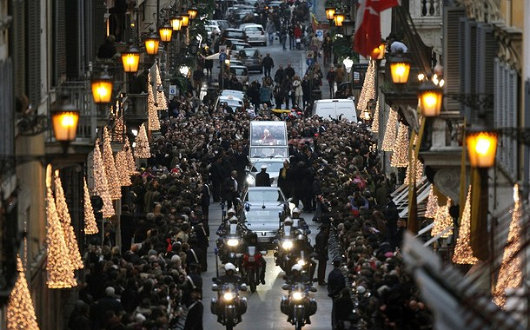
In 1856, Pope Pius IX erected a column dedicated to the Blessed Virgin in the Piazza di Spagna, commemorating the Proclamation of the Dogma of the Immaculate Conception just two years before, and since that year every reigning pontiff has remembered the Virgin at her column on the feast of the Immaculate Conception. Above, the Pope is seen turning onto the Via Condotti which leads to the Piazza di Spagna. The Palazzo Malta is designated by the flags on the right. (more…)
Benedict in Bohemia and Moravia
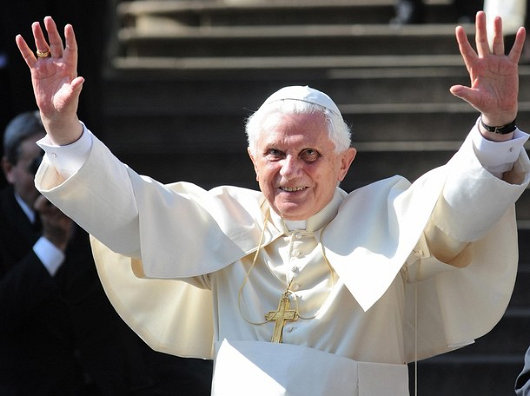
THE HOLY FATHER, Pope Benedict XVI, recently travelled to the Czech Republic in a journey he described as “both a pilgrimage and a mission.” The ancient land of Bohemia was once at the very center of Christian civilization. It was from here that the brother saints Cyril and Methodius launched their mission to convert the Slavic world. From Prague, the realms of the Přemyslid and then Luxembourg dynasties were ruled, followed by the most illustrious house of Hapsburg. Oh to have been in Prague under the reign of the Emperor Rudolf II! With his mysterious court of astrologers and magicians and his cabinet of curiosities. With Arcimboldo, Spranger, Heintz, and Hans von Aachen putting paint to canvas, Giambologna and de Vries sculpting, while Kepler and Tycho Brahe searched the night skies. Centuries later, long after the nucleus of Hapsburg power had moved to Vienna, it was to Prague that the Emperor Ferdinand came following his abdication and remained until his death in 1875.
But of course there is the other Prague — the city of heresy, rebellion, and warfare. (more…)
Search
Instagram: @andcusack
Click here for my Instagram photos.Most Recent Posts
- Burns Tower April 19, 2024
- Patrick in Parliament March 18, 2024
- Articles of Note: 13 March 2024 March 13, 2024
- Cambridge March 9, 2024
- Taken on Trust March 4, 2024
Most Recent Comments
Book Wishlist
Monthly Archives
Categories

